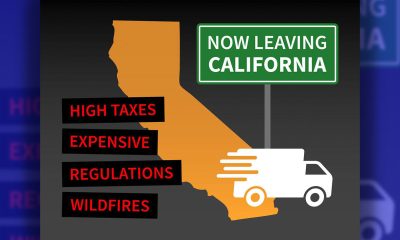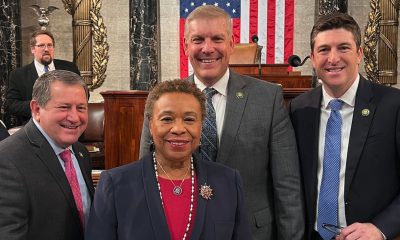Bay Area
OPINION – Will The 2020 Census Change the Course of History for the Black Community?

Every 10 years, the U.S. Census Bureau works to conduct an accurate count of the nation’s population, as provided for under the U.S. Constitution. This decennial count – which is currently underway – is one of our nation’s most inclusive civic activities, including every person living in the country, regardless of age, race, ethnicity, religion or citizenship.
An accurate count is essential to our democracy and our community’s growth because the data helps determine how much federal funding and political representation each state and community receives.
Census results are used to determine political seats and draw district lines for all levels of government and to allocate hundreds of billions of dollars in federal spending nationwide for critical community resources like parks, infrastructure, health care, and support programs in education, housing grants and nutrition.
African Americans have been systematically undercounted from the very first census, disadvantaging Black communities and neighborhoods, and silencing our voices. An inaccurate census count can negatively impact community programming for schools, housing, health care services, business investment and much more.
The first census count in 1790 deliberately listed only the names of the heads of free Black households, while all other free persons were listed by age.
By the 1860 census, at the start of the Civil War, the Black population increased to 4.4 million, about 14% of the overall population of the country. Yet, the explicit undercount of the Black population continued until the first post-Civil War census in 1870, following granting citizenship and equal civil and legal rights to African Americans and slaves under the Fourteenth Amendment.
Over the following century, explicit discrimination was outlawed – but systemic discrimination persisted.
Even today, the Census continues to disproportionately and systematically undercount the Black population. Black men have been undercounted in greater numbers than men of any other racial or ethnic group.
In 2010, Black children were undercounted at twice the rate as a young non-Black child, affecting the funding for programs designed to serve children and families, like Supplemental Nutrition Assistance Programs and the National School Lunch Program.
Even as the 2010 census overcounted the population as a whole, it undercounted the Black population by more than 800,000 people.
Certainly, there are social and economic problems that make the Black community hard-to-count, including increased rates of housing instability, industrialized incarceration, homelessness, and even lack of internet access.
And a deep distrust of government and concerns about privacy only make things worse.
This means many in the Black community are “missing” in their own communities, hiding in plain sight – even to this day.
These are unprecedented times. So, we must come together to ensure that Black communities are seen, heard and counted.
That starts by ensuring that people know what to do to participate: You can go to my2020census.gov right now to fill out the form. It’s a simple, confidential nine-question survey that asks for basic information like your name, address, sex, race, and age.
For those who prefer to fill out the form over the phone, you can dial 844-330-2020 to participate.
And don’t forget, your responses to the Census are protected by law and cannot be shared with, or used by, any other government agencies. Answers cannot be used for law enforcement purposes or to determine eligibility for government benefits or immigration enforcement.
Black Californians deserve a fair and accurate census count in 2020. Our democracy relies on accurate data to make sound decisions that reflect our country’s needs. An accurate representation of our communities in the census will allow Black Americans to have a greater influence over resources and representation and the ability to hold lawmakers accountable. The Black community has an opportunity to change the history of the census in 2020 and participate in record numbers – let’s seize this moment.
David Tucker is with the California Census Complete Count Office.
Activism
Oakland Post: Week of April 24 – 30, 2024
The printed Weekly Edition of the Oakland Post: Week of April 24 – 30, 2024

To enlarge your view of this issue, use the slider, magnifying glass icon or full page icon in the lower right corner of the browser window. ![]()
Alameda County
DA Pamela Price Stands by Mom Who Lost Son to Gun Violence in Oakland
Last week, The Post published a photo showing Alameda County District Attorney Pamela Price with Carol Jones, whose son, Patrick DeMarco Scott, was gunned down by an unknown assailant in 2018.

Publisher’s note: Last week, The Post published a photo showing Alameda County District Attorney Pamela Price with Carol Jones, whose son, Patrick DeMarco Scott, was gunned down by an unknown assailant in 2018. The photo was too small for readers to see where the women were and what they were doing. Here we show Price and Jones as they complete a walk in memory of Scott. For more information and to contribute, please contact Carol Jones at 510-978-5517 at morefoundation.help@gmail.com. Courtesy photo.
Bay Area
State Controller Malia Cohen Keynote Speaker at S.F. Wealth Conference
California State Controller Malia Cohen delivered the keynote speech to over 50 business women at the Black Wealth Brunch held on March 28 at the War Memorial and Performing Arts Center at 301 Van Ness Ave. in San Francisco. The Enterprising Women Networking SF Chapter of the American Business Women’s Association (ABWA) hosted the Green Room event to launch its platform designed to close the racial wealth gap in Black and Brown communities.

By Carla Thomas
California State Controller Malia Cohen delivered the keynote speech to over 50 business women at the Black Wealth Brunch held on March 28 at the War Memorial and Performing Arts Center at 301 Van Ness Ave. in San Francisco.
The Enterprising Women Networking SF Chapter of the American Business Women’s Association (ABWA) hosted the Green Room event to launch its platform designed to close the racial wealth gap in Black and Brown communities.
“Our goal is to educate Black and Brown families in the masses about financial wellness, wealth building, and how to protect and preserve wealth,” said ABWA San Francisco Chapter President LaRonda Smith.
ABWA’s mission is to bring together businesswomen of diverse occupations and provide opportunities for them to help themselves and others grow personally and professionally through leadership, education, networking support, and national recognition.
“This day is about recognizing influential women, hearing from an accomplished woman as our keynote speaker and allowing women to come together as powerful people,” said ABWA SF Chapter Vice President Velma Landers.
More than 60 attendees dined on the culinary delights of Chef Sharon Lee of The Spot catering, which included a full soul food brunch of skewered shrimp, chicken, blackened salmon, and mac and cheese.
Cohen discussed the many economic disparities women and people of color face. From pay equity to financial literacy, Cohen shared not only statistics, but was excited about a new solution in motion which entailed partnering with Californians for Financial Education.
“I want everyone to reach their full potential,” she said. “Just a few weeks ago in Sacramento, I partnered with an organization, Californians for Financial Education.
“We gathered 990 signatures and submitted it to the [California] Secretary of State to get an initiative on the ballot that guarantees personal finance courses for every public school kid in the state of California.
“Every California student deserves an equal opportunity to learn about filing taxes, interest rates, budgets, and understanding the impact of credit scores. The way we begin to do that is to teach it,” Cohen said.
By equipping students with information, Cohen hopes to close the financial wealth gap, and give everyone an opportunity to reach their full financial potential. “They have to first be equipped with the information and education is the key. Then all we need are opportunities to step into spaces and places of power.”
Cohen went on to share that in her own upbringing, she was not guided on financial principles that could jump start her finances. “Communities of color don’t have the same information and I don’t know about you, but I did not grow up listening to my parents discussing their assets, their investments, and diversifying their portfolio. This is the kind of nomenclature and language we are trying to introduce to our future generations so we can pivot from a life of poverty so we can pivot away and never return to poverty.”
Cohen urged audience members to pass the initiative on the November 2024 ballot.
“When we come together as women, uplift women, and support women, we all win. By networking and learning together, we can continue to build generational wealth,” said Landers. “Passing a powerful initiative will ensure the next generation of California students will be empowered to make more informed financial decisions, decisions that will last them a lifetime.”
-

 Activism4 weeks ago
Activism4 weeks agoOakland Post: Week of March 27 – April 2, 2024
-

 #NNPA BlackPress4 weeks ago
#NNPA BlackPress4 weeks agoBeloved Actor and Activist Louis Cameron Gossett Jr. Dies at 87
-

 Community2 weeks ago
Community2 weeks agoFinancial Assistance Bill for Descendants of Enslaved Persons to Help Them Purchase, Own, or Maintain a Home
-

 Activism3 weeks ago
Activism3 weeks agoOakland Post: Week of April 3 – 6, 2024
-

 Business2 weeks ago
Business2 weeks agoV.P. Kamala Harris: Americans With Criminal Records Will Soon Be Eligible for SBA Loans
-

 Activism2 weeks ago
Activism2 weeks agoOakland Post: Week of April 10 – 16, 2024
-

 Community2 weeks ago
Community2 weeks agoAG Bonta Says Oakland School Leaders Should Comply with State Laws to Avoid ‘Disparate Harm’ When Closing or Merging Schools
-

 Community1 week ago
Community1 week agoOakland WNBA Player to be Inducted Into Hall of Fame
























































